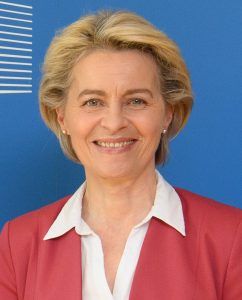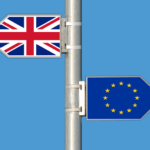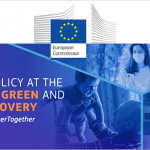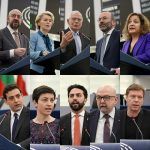Thank you very much Klaus,
Ladies and Gentlemen,
Indeed, following your introduction, dear Klaus, it is difficult to believe that in Davos today we are talking about war. Because the Davos spirit is the antithesis of war. It is about forging ties and together finding solutions for the big challenges of the world. You might remember, and you worked on it together with us, that in recent years, we have looked for smart and sustainable ways to fight climate change; and how to shape globalisation so that all can benefit; how to make digitalisation a force for good, and mitigate its risks for democracies. So Davos is all about crafting a better future together. That is what we should be talking about here today. But instead, we must address the costs and consequences of Putin’s war of choice. The playbook of Russia’s aggression against Ukraine comes straight out of another century. Treating millions of people not as human beings but as faceless populations to be moved or controlled, or set as a buffer between military forces. Trying to trample the aspiration of an entire nation with tanks. This is not just a matter of Ukraine’s survival. This is not just an issue of European security. This is putting our whole international order into question. And that is why countering Russia’s aggression is a task for the entire global community.
Ukraine must win this war. And Putin’s aggression must be a strategic failure. So we will do everything we can to help Ukrainians prevail and retake the future into their hands. For the first time in history, the European Union is providing military aid to a country under attack. We are mobilising our full economic power. Our sanctions and the self-sanctioning by companies themselves are draining Russia’s economy and thus draining the Kremlin’s war machine. Our Member States are caring for six million Ukrainian refugees. And actually, there are eight million internally displaced people in Ukraine itself. And in parallel, Ukraine needs direct budget support now to keep the economy running – it is about pensions; it is about salaries; it is about the basic services that have to be provided. And therefore, we have proposed a EUR 10 billion macro-financial assistance – it is the largest package of macro-financial assistance ever conceived by the European Union for a third country. Other countries, starting with our friends in the United States, are doing their utmost, too. It is an economic relief operation with no precedent in recent history.
But that is the short term, and much more needs to be done. So with the same resolve, we will – hand in hand – help Ukraine rise from the ashes. That is the idea behind the reconstruction platform that I proposed to President Zelenskyy. You remember that yesterday, in his speech here in Davos, he recognised the unprecedented unity of the democratic world – the understanding that freedom must be fought for. So the rebuilding of Ukraine also calls for an unprecedented unity. As President Zelenskyy said: the work that has to be done is colossal. But together, we can and we will master the challenge. That is why I have proposed this reconstruction platform to be led by Ukraine and the European Commission, because we will combine reform with investment.
The platform invites global contributions – from any country that cares about the future of Ukraine, from international financial institutions, from the private sector. We need everyone on board. And I was very glad to hear about the Lugano initiative, yesterday. Børge Brende called it a Marshall Plan for Ukraine. And, Ladies and Gentlemen, we should leave no stone unturned – that is including, if possible, the Russian assets that we have frozen. But this is not only about undoing the damage of Putin’s destructive fury, it is also about building the future that Ukrainians have chosen themselves. For years now, the people of Ukraine have worked for change. That is why they elected Volodymyr Zelenskyy in the first place. The reconstruction of the country should combine massive investment with ambitious reforms. For example, to modernise Ukraine’s administrative capacity; to firmly establish the rule of law and the independence of the judiciary; to fight corruption; to get rid of the oligarchs; to build a fair, sustainable and strong competitive economy; and thus to firmly support Ukraine in pursuing its European path. Ukraine belongs in the European family. Ukrainians have stood tall in the face of brutal violence. They have stood for their own freedom but also for our values and for humanity. So we stand with them. And I think that this is a defining moment for all democracies on the whole globe.
Ladies and Gentlemen,
This conflict is also sending shockwaves throughout the world, further disrupting supply chains already stretched by the pandemic. It is putting new burdens on businesses and households, and it has created a thick fog of uncertainty for investors across the globe. And more and more companies and countries, already battered by two years of COVID-19 and all the resulting supply chain issues, must now cope with rising prices for energy as a direct result of Putin’s unpardonable war. And Russia has tried to put pressure on us, for example, by cutting off the energy supplies, the gas supplies of Bulgaria, Poland, and now lately Finland. But this war and this behaviour we see have only strengthened Europe’s resolve to get rid of Russian fossil fuels dependency, rapidly.
The climate crisis cannot wait. But now, the geopolitical reasons are evident, too. We have to diversify away from fossil fuels. We have already set our course towards climate neutrality. Now, we must accelerate our clean energy transition. Fortunately, we are already having in place the means to do so. The European Green Deal is already ambitious. But now, we are taking our ambition to yet another level. Last week, the European Commission tabled and proposed REPowerEU. That is our EUR 300 billion plan to phase out Russian fossil fuels and fast forward the green transition. Today, if we look at the share of renewables we have in Europe, almost a quarter of the energy we consume in Europe stems from renewable sources already. This is the famous European Green Deal. But now, through REPowerEU, we will practically double this share to 45% in 2030.
This is only possible by also bringing cross-border cooperation to a new level. Take, for example, the North Sea of Europe and what is happening there. Last week, we had four European Member States joining forces to harness the energy of offshore wind. They decided to quadruple their offshore wind capacity by 2030. That will mean: wind farms in the North Sea will cover the annual energy consumption of more than 50 million homes – this is roughly one quarter of all European households. This is the right way to go. Renewable energy is basically our springboard towards net-zero CO2 emissions. It is good for the climate, but it is also good for our independence and for our security of energy supply.
The same is true for the diversification of our gas supply. This is another pillar of REPowerEU. As we speak, Europe is concluding new agreements with reliable, trustworthy suppliers all over the world. In March, I agreed with President Biden to significantly step up LNG deliveries from the United States to the European Union. The amount will replace round about one third of the Russian gas we have today. More LNG and pipeline gas will also come from the Middle East and North Africa. New LNG terminals in Greece, in Cyprus and in Poland will soon become operational, as will new interconnectors. And important is that the connecting pipeline infrastructure will then over time form the core of our hydrogen corridors. Hydrogen, Ladies and Gentlemen, is the new frontier of Europe’s energy network.
But we must also think further ahead. The economies of the future will no longer rely on oil and coal, but on lithium for batteries; on silicon metal for chips; on rare earth permanent magnets for electric vehicles and wind turbines. And it is sure: the green and digital transitions will massively increase our need for these materials. However, if we look at where we are today, access to these materials is not at all a given. For many of them, we rely on a handful of producers all over the world. So, we must avoid falling into the same trap as with oil and gas. We should not replace old dependencies with new ones. We are therefore working to ensure the resilience of our supply chains. And again, strong international partnerships are at the heart of the solution. The Commission has already secured strategic raw materials partnerships with countries like Canada. And additional reliable partnerships will follow. Once again: Together, we can create more balanced interdependencies and build supply chains that we can really trust.







Leave a Reply